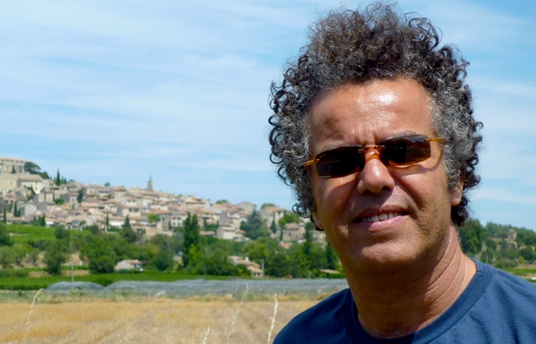People in Film: Hakim Belabbas
Apr 30, 2013

Hakim Belabbas was born in Morocco. He obtained a BA in American and African literature in 1983 from Mohamed V University in Rabat, and a graduate degree in film and video from Columbia College in Chicago, where he teaches film direction and production. He has produced and directed several award-winning films.
DFI: When was your first opportunity to produce a film? How did you start your career?
Hakim Belabbas: After I got my graduate degree, I had to make a thesis film. It was a catalyst in my career because I found myself dealing with the two sides of filmmaking: fiction and non-fiction. I started from that point.
DFI: Merging fiction and non-fiction is a hallmark of your work. Why do you follow this style?
HB: I really don’t care whether a film is fiction or non-fiction. I think that differentiation is dead. Film is about storytelling in images. Having made my first film about my own family and the notion of exile, I instinctively became aware of my own [understanding of making cinema]. That first film put me on a track of experimentation. The [important thing] is the humanity of the stories I tell. I don’t pay much attention to what we call exceptional stories.
DFI: Is using this style challenging for you?
HB: There are times when I feel frustrated. The common thread through filmmaking is the Hollywood machine: fictional films with [defined] narrative arcs. But there are gems that are compelling and surprising, like the works of masters such as Kurosawa, Ozu, Kiarostami, Makhmalbaf. Filmmaking is always hard and it is not about easy solutions. [Sometimes] I find myself in a mess, but I have to live with my choices. I don’t want to make movies so I can wear a tuxedo and walk the red carpet. I tell the stories of those who have no voice. I find that I relate to people who have to struggle for their own dignity, who have to find ways to educate their kids, or find a moment of happiness.
DFI: In the end do you have to follow the mainstream so you can promote your productions?
HB: We [Arab filmmakers] are still slaves of the old masters, of the people who we think are better [than we are] in this field. But our storytelling is oral. We are great oral storytellers. That could be a great way to discover the metaphor of language and translate it into the visual. Usually I steal what I hear and most of the time, wisdom comes from simple people.
DFI: You prefer not to write scenarios and shoot your scenes freely. Do you find success with this method?
HB: [My approach] is not improvisation. It is like free-styling. This comes when you have mastered the rules. I do write a script, then throw it away because it limits my horizons. I need to be open to the ways of the world and its surprises. I have to know what my theme is and where it expresses itself. I can’t guarantee that every time I shoot my instinct is going to be right. [This approach] is something I would like to explore with young filmmakers, but it is not about taking a camera and shooting without having anything in mind.
DFI: Do your films reach a wide audience, or a more narrow group of people who can understand your style?
HB: I believe my films are about ordinary people. They should be simple – and they are. Then I think I should be the champion of the masses in terms of the box office [laughs]… but of course I am not. Cinema has been sold to people as a mean of escape. Film is about entertainment, but also about illumination. Most people want to talk about what makes them think of their own lives, their struggles and moments of happiness. Others want to see something different to their own lives.